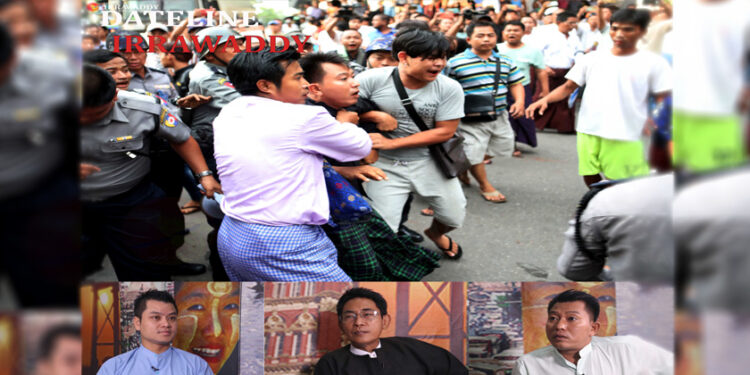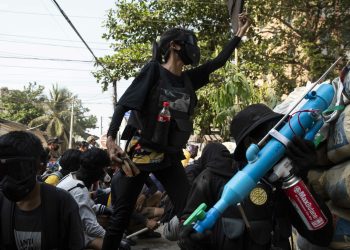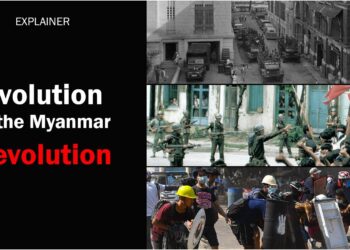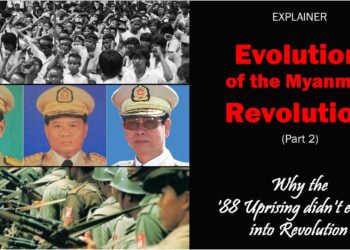Kyaw Kha: Welcome to Dateline Irrawaddy! This week, we’ll discuss if civilian thugs are back after we saw the use of them to arrest anti-war protesters in Yangon’s Tamwe Township on Saturday. I’m The Irrawaddy chief reporter Kyaw Kha and I am joined by the chairman of the Anti-Injustice Committee Ko Myat Kyaw and legal advisor U Khin Maung Myint.
Ko Myat Kyaw, you said you saw a protester beaten and arrested by the police as well as people in ordinary clothes. Does this remind you of something, as we saw the same situation [the use of civilian thugs in a crackdown on student protesters against the National Education Law] in 2015?
Myat Kyaw: This reminds me of the time that one of the men wearing red armbands gripped a girl by her neck during the student protests. Speaking of the protest on Saturday, I was there. I greeted protesters and was talking with my guests near them. Then, I heard someone say that the protest had been called off to avoid trouble. Protesters stood up and prepared to leave.
About 10 to 15 seconds later, some 60 police with shields pushed through the crowd and blocked a man—I think it was Ko Aung Myin from the ACDC [Action Committee for Democracy Development]—on a corner outside Ocean Center. Others fled. I was on the opposite side of the road. I crossed the road and stood on the traffic island. There were no policemen there. Then, a man came and grasped my arms, and glared at me threateningly. I struggled. Then, another four or five men arrived, grabbed me and punched me several times. They called me the protest leader. There were no police near me at that time.
KK: Were you the protest leader?
MK: No, I just went there to support and help the protesters. What they said was a lie. I was not the protest leader. But they called me the protest leader and pulled me to the other side of the road. There another four or five men beat me. Then, a few policemen came and perhaps stopped them from beating me. I didn’t hear the police say: “You get lost. It is our duty. We’ll handle him.” None of the policemen ordered them to stop. Then, I was taken to a prisoner transport vehicle.
I feel like there was no rule of law at all. The police force failed to act in accordance with the law. As far as I know, they have received [crowd management] training conducted by the EU. But they didn’t bother to negotiate with protesters. Again, according to the law, there must be three circles of police cordon and police can take action only when protesters break into the last cordon. I don’t want to call it a crackdown, but I’d say force was used on protesters near the end of the protest.
KK: Ko Myat Kyaw said the police didn’t act in line with the law. U Khin Maung Myint, was the dispersal in line with legal procedures or not?
Khin Maung Myint: We had heated discussions on the same matter around March 2015. Police used civilian thugs in dispersing crowds that gathered against the Peaceful Assembly and Procession Law. There are legal provisions regarding this. Section 128 of the Code of Criminal Procedure allows the use of force in dispersing crowds, and the Police Manual 1058 and riot management laws specify the circumstances under which force can be used. Police are allowed to seek the assistance of male civilians in dispersing a crowd only when the number of police is fewer than that of the unlawful assembly.
In the Tamwe case, the police outnumbered protesters. So, it was not necessary for the police to use civilians. If civilians are to be used, a list of their complete names must be submitted and approved by a magistrate prior to the dispersal. It is still unclear who those civilians were and if a magistrate had approved their use. Unless it were clear, I’d say the use of civilians was against the law.
The law states that if police are to use auxiliary police or civilians to disperse protesters, they shall use those who are respected by or those who have influence over the protesters. In the Tamwe case, when protesters said they were about to stop their protest and disperse and asked the police to provide security, the civilians used by the police were not the ones who were respected by the protesters.
What’s more, their behaviors appeared to disperse the crowd with force rather than through peaceful negotiations. So, I’d say it was against the law. Finally, the law does not allow auxiliary police or vigilantes to use violence. They are only allowed to negotiate with and calm protesters. As everyone witnessed the crackdown, police merely blocked the protesters and arrests and beatings were mainly carried out by civilian thugs. From a legal point of view, those actions were against the law.
KK: So, should legal action be taken against them?
KMM: An extensive investigation must be conducted to find out who they are and who orchestrated them, if prior approval from a judge was sought and given, and if the civilian thugs were deliberately ordered to forcibly disperse the protesters or if they used force without such an order. Such an investigation should be made.
KK: Ko Myat Kyaw, who do you think those civilian thugs are?
MK: I recognized a man who staged a protest against the [National League for Democracy] government, for whom an arrest warrant has been issued. We are really shocked by the law of the country that allows a fugitive to beat a civilian in front of police. A protest march in which protesters marched from Sule to Tamwe in support of the clashes and the Tatmadaw was held the same day and finished at 4 p.m. They were not blocked or arrested. But anti-war protesters were.
The Myanmar Police Force under the Home Affairs Ministry should be very ashamed, if they even know what shame is. They should apply the law equally. If they wanted to bar the protest because of other problems facing the country, they should have barred both protests. They should act fairly. I would question the dignity of a police force that allowed a fugitive to commit violence freely in front of many police majors and a hundred policemen with armored police cars. Our country doesn’t accept the culture of supporting violence. We oppose it. That’s why we staged the protest. To answer your question, I saw people who have participated in anti-government protests and there is photographic evidence.
KK: While laws are issued for the public, law enforcement officers must also respect and obey the law. As you have pointed out, police went against procedure in the Tamwe case. In previous cases, we’ve witnessed photos of civilian thugs with red armbands arresting protestors in front of Yangon’s City Hall, and in Letpadan and Hlaing Tharyar. Thus far, no action has been taken against them. What will happen if they remain uncontrolled?
KMM: Considering what happened in Tamwe, the regional and Union governments and parliaments need to seriously consider this. Our country is lacking in two concepts. One is that the police, who are authorized to enforce the law, are only authorized to act according to existing laws and not authorized to overstep the law. Another concept that is missing is that even if joining an unlawful assembly is against the law, protestors still should enjoy legal protection under existing laws. As these two concepts are missing in our country, unnecessary violence happens. We need to fix this.
There will continue to be public assembly in all countries, democratic or not. In our country, the constitution provides for peaceful assembly and procession. According to the Peaceful Assembly and Procession Law, protesters only need to inform and need not seek permission to stage a protest. The government must find an answer as to how to prevent the unlawful use of civilian thugs in crackdowns in the future and how to comply with the law when it is necessary to use civilians.
KK: Ko Myat Kyaw, can you explain what happened after the arrest?
MK: We were arrested and brought to Yankin Police Station around 6 p.m. After 20 minutes of interrogation there, we were brought to the South Okkalapa Police Station in a prisoner transport vehicle. We were interrogated there and then brought to Mingalar Taung Nyunt Police Station. There we stayed overnight. Within 24 hours, Bahan Police Station, as the Ocean Center [near where protesters assembled] is in Bahan Township, charged us with Article 20 [of the Peaceful Assembly and Procession Law], and asked us to apply for bail. We guaranteed to attend trial when summoned and were released. The rule of law is very disappointing in Myanmar as you can see in the case of Thilawa [special economic zone in Yangon] in which police shot recklessly [during their eviction of local farmers on Saturday]. Anti-war protesters were arrested in the cases of Tamwe, Mandalay and Paungde, and at a peace poem recitation event [on Monday]. It seems that we have to ask more loudly why we are afraid of peace. I think we need to engage in more pro-peace activities.
KK: Peace marches were held and anti-war protesters were arrested in Mandalay. In Yangon, there was even a confrontation. What would be the best way to avoid confrontation?
KMM: The two sides should negotiate to minimize confrontation, as the Constitution provides citizens the right to peaceful assembly and procession for any reason. Protesters should not think that they don’t need permission from authorities just because they have good intent and a good purpose. They should work within the legal framework.
Law enforcement personnel have a greater responsibility. In the Tamwe case, there were ways to avoid confrontation. Authorities could negotiate with protesters and persuade them to reduce their numbers. For example, if there were 100 protesters, authorities could ask them to reduce their numbers, saying that such a large crowd could impact the public order. They could also ask protesters to change their route, saying that the chosen route could impact community peace and tranquility. Or authorities could ask them to change the way they protest. For example, instead of marching, they could ask them to gather somewhere or change the venue. Confrontation should have been avoided through such negotiations.
In the Tamwe case, the anti-war protesters clung to their intention and purpose and administrative authorities including the police, who are obliged to enforce the law, focused on how to disperse and take action against the protesters rather than negotiate with them ahead of the protest. This is wrong. We need to find a solution for future cases, learning from this case. You can always find an answer through negotiation for peace or any issue. We saw a counterintuitive result in Tamwe because of weak negotiation or resistance to negotiation. I would suggest that the two sides find a solution according to the law through negotiation.
KK: Thank you for your contributions!

















